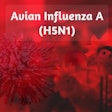
Infectious laryngotracheitis (ILT) could be controlled and prevented by administering ILT recombinant antigens through natural mucosal routes in poultry.
According to a research project performed at the University of Georgia (UGA), the strategy may induce effective T-cell responses that can quickly clear the virus and help prevent additional virus replication and shedding. T-cells are a type of white blood cell that plays an essential role in the immune system.
The research evaluated the ocular route and in-ovo route to administer adjuvanted deoxyribonucleic acid (DNA) plasmids, meaning that the plasmids are combined with a substance to boost the immune system's reaction. The plasmids express ILT glycoproteins delivered by calcium phosphate nanoparticles, which help the plasmids enter cells more effectively.
After in-ovo immunizations, hatchability was not affected and both the in-ovo and eye-drop immunizations did not impact body weight gain. Additionally, the eye-drop route resulted in a 91% survivability rate after birds were challenged with a virulent ILT strain.
The project was conducted because current vaccine strategies to address ILT either have limitations to their effectiveness or can cause performance issues.
According to the researchers, the project demonstrated the safety of the plasmid formulations for in-ovo and eye-drop administration. Furthermore, it proved that plasmid immunizations were effective in preventing mortality due to ILT and reducing clinical signs of the disease through the ocular route.
Future research will be focused on further improving local immune responses to the disease.
More about ILT and current vaccination strategies
ILT is a contagious respiratory disease in poultry. After birds recover from the disease, they become carriers, making reinfection of the flock probable. Currently, there are two vaccinations to prevent ILT in poultry: chicken embryo origin (CEO) vaccines and recombinant vaccines.
The CEO form is a live attenuated vaccine. CEO vaccines provide a significant amount of protection by reducing virus shedding and the impact of disease outbreaks. While they are effective, they can cause increased virulence of ILT and can result in performance issues.
Recombinant vaccines can effectively reduce the disease but have reduced protection and a delayed onset of immunity. However, they are considered a safer vaccination option against ILT because they are not virulent during usage and can be safely given in the hatchery.



















